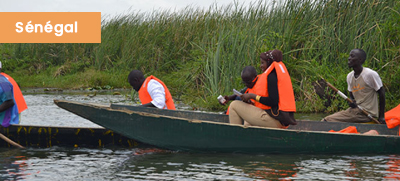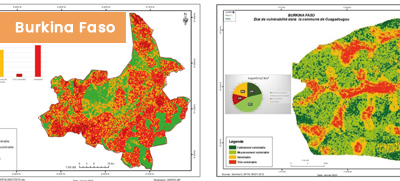Home » Centre de Suivi Écologique – Sénégal
Centre de Suivi Écologique – Sénégal

Support for the fishing community in the Tocc-Tocc Community Natural Reserve in Senegal by regularly monitoring the dynamics of invasive aquatic plants
As part of the implementation of the GMES&Africa Program, the Centre de Suivi Ecologique (CSE), has been coordinating the Sustainable Management of Wetlands for the Strengthening of Food Security and Ecosystem Resilience in West Africa (GDZHIAO) project since 2017.
Supporting Local Municipalities of Bobo-Dioulasso and Ouagadougou to Deal With Vulnerability to Flooding
This use case details the consortium’s engagement with end-users in Burkina Faso to support them in analyzing climate change mitigation, adaptation, and managing flood risks. Two municipalities, Bobo-Dioulasso and Ouagadougou, were identified to implement the work.
GESTION DURABLE DES ZONES HUMIDES ET DES INONDATIONS EN AFRIQUE DE L’OUEST (GDZHIAO)
L’objectif du projet GDZHIAO est d’aider les décideurs et les parties prenantes à gérer les zones humides et les inondations en Afrique de l’Ouest. Ces écosystèmes importants fournissent des ressources pour la sécurité alimentaire, l’approvisionnement en eau et les activités culturelles et récréatives, mais ils sont vulnérables à la dégradation due à des facteurs tels que le changement climatique, la déforestation et l’urbanisation. C’est dans ce but que le projet vise à fournir des outils, des processus et des données nécessaires au suivi et à la gestion efficaces des zones humides, au contrôle et à l’évaluation des inondations à plusieurs échelles et à la mise en place d’un cadre législatif et réglementaire harmonisé pour la gestion de ces environnements dans l’espace CEDEAO.
Responsable du Consortium : Centre de Suivi Ecologique (CSE) – Sénégal.
Couverture Géographique : Le projet couvre dix (10) pays d’Afrique de l’Ouest : Bénin, Burkina Faso, Côte d’Ivoire, Gambie, Ghana, Guinée, Mali, Niger, Nigeria et Sénégal.
Orientation: Les données d’observation de la Terre sont utilisées dans le cadre de ce projet pour accroître la résilience des écosystèmes face au changement climatique, contribuant ainsi à la sécurité alimentaire des populations vivant à proximité du patrimoine naturel et des écosystèmes sensibles. Les bénéficiaires et les utilisateurs jouissent de produits de qualité sur les thèmes suivants :
- La dynamique des eaux de surface (plans d’eau) ;
- La turbidité des eaux de surface ;
- La végétation aquatique envahissante ;
- La cartographie dynamique des mangroves ;
- Le suivi et la cartographie des zones inondables et inondées ;
- L’ alerte précoce.
Blog: gdzhao.gmes.cse.sn
SUSTAINABLE WETLANDS AND FLOOD MANAGEMENT IN WEST AFRICA (GDZHIAO)
The GDZHIAO project aims to help decision-makers and stakeholders manage wetlands and floods in West Africa. Wetlands are important ecosystems that provide resources for food security, water supply, and cultural and recreational activities, but they are vulnerable to degradation from factors such as climate change, deforestation, and urbanization. The project seeks to provide tools, processes, and data to effectively monitor and manage wetlands, monitor and evaluate floods at several scales, and establish a harmonized legislative and regulatory framework for managing these environments in the ECOWAS space.
Consortium Leader: Centre de Suivi Ecologique (CSE) – Senegal.
Coverage: The project covers ten (10) West African countries: Benin, Burkina Faso, Côte d’Ivoire, Gambia, Ghana, Guinea, Mali, Niger, Nigeria, and Senegal.
Focus: The project utilizes earth observation data to increase the resilience of ecosystems to climate change, contributing to food security for populations living near rich and sensitive ecosystems. Beneficiaries and users are provided with quality products on:
- Surface water dynamics (water bodies)
- Surface water turbidity
- Invasive aquatic vegetation
- Dynamic mapping of mangroves
- Monitoring and mapping of flood-prone and flooded areas
- Early warning.
Blog: gdzhao.gmes.cse.sn
SUSTAINABLE WETLANDS AND FLOOD MANAGEMENT IN WEST AFRICA (GDZHIAO)
The GDZHIAO project aims to help decision-makers and stakeholders manage wetlands and floods in West Africa. Wetlands are important ecosystems that provide resources for food security, water supply, and cultural and recreational activities, but they are vulnerable to degradation from factors such as climate change, deforestation, and urbanization. The project seeks to provide tools, processes, and data to effectively monitor and manage wetlands, monitor and evaluate floods at several scales, and establish a harmonized legislative and regulatory framework for managing these environments in the ECOWAS space.
Consortium Leader: Centre de Suivi Ecologique (CSE) – Senegal.
Coverage: The project covers ten (10) West African countries: Benin, Burkina Faso, Côte d’Ivoire, Gambia, Ghana, Guinea, Mali, Niger, Nigeria, and Senegal.
Focus: The project utilizes earth observation data to increase the resilience of ecosystems to climate change, contributing to food security for populations living near rich and sensitive ecosystems. Beneficiaries and users are provided with quality products on:
- Surface water dynamics (water bodies)
- Surface water turbidity
- Invasive aquatic vegetation
- Dynamic mapping of mangroves
- Monitoring and mapping of flood-prone and flooded areas
- Early warning.
Blog: gdzhao.gmes.cse.sn
Publications

Support for the fishing community in the Tocc-Tocc Community Natural Reserve in Senegal by regularly monitoring the dynamics of invasive aquatic plants
As part of the implementation of the GMES&Africa Program, the Centre de Suivi Ecologique (CSE), has been coordinating the Sustainable Management of Wetlands for

Supporting Local Municipalities of Bobo-Dioulasso and Ouagadougou to Deal With Vulnerability to Flooding
This use case details the consortium’s engagement with end-users in Burkina Faso to support them in analyzing climate change mitigation, adaptation, and managing flood

